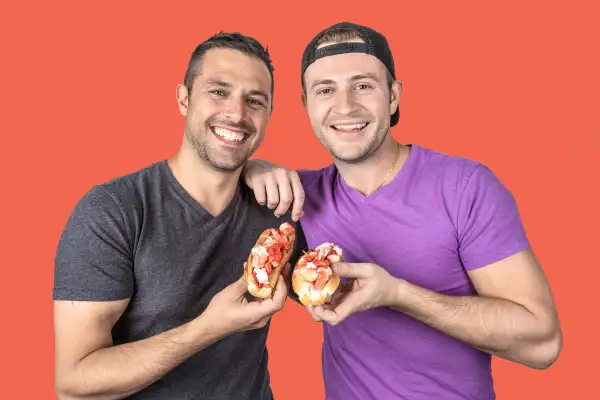These Two Cousins Got Drunk and Decided to Start a Lobster Truck. Now They’re Running a $20 Million Business

Anyone who says you can’t turn your food passion into big money hasn’t met Sabin Lomac and Jim Tselikis. Raised in Maine, the two cousins channeled their love of the state’s local lobster into Cousins Maine Lobster, a food truck they started in Los Angeles that has since blown up across the United States and beyond—and is now earning them eight-figure revenue.
It wasn’t quite as simple as it may seem, though. Lomac, 37, and Tselikis, 33, put up quite a bit of their own money and risked a lot to make their dreams happen. They also had to learn a lot along the way, as they detail in their new book Cousins Maine Lobster: How One Food Truck Became a Multi-Million Dollar Business. We talked to them about how they made big bucks off lobster and the hardest lessons of being an entrepreneur.
An Intoxicating Idea
Cousins Maine Lobster started with modest ambitions. In 2011, Tselikis visited Lomac in Los Angeles. One night during an alcohol-fueled sushi dinner on Sunset Boulevard, they bonded over their shared fondness for the food they grew up with together in Maine. “The point that resonated was our loyalty, love, and devotion to our family, and the one thing that was always there for the family times was the lobster,” Tselikis says. “We’re like, ‘Why don’t we bring this lobster out to LA?’ ... The best ideas come when you’re intoxicated.”
So they sketched out a business plan. They decided on a food truck, a growing business in the area at the time, and each invested $20,000 of their own money. Both had saved substantially from their regular jobs—Tselikis was in management while Lomac worked in real estate—and had faith in their idea. Over the next year, they worked with Maine lobster purveyors to get the sustainable shellfish out to California. The original truck was delivered to them late, and employees lacked proper training.
But the upside became clear as soon as customers were eating. “There were 80 people in line raving about the product,” Tselikis says. According to figures provided by Cousins Maine, that truck earned $890,824 in gross sales during 2012, its first year. Five years later, the company brought in more $20 million in 2017.
“In hindsight, we realized how beautiful and special [Maine lobster] was,” Lomac says of the concept. “You could only get it [around LA] at fine-dining restaurants for $80 dollars as surf and turf.” In the early days, Cousins Maine Lobster sold mostly lobster rolls, but it now turns out many fast-casual twists on the crustacean, including tater tots served with pico de gallo and a cilantro lime sauce, which is doing “gangbusters,” according to Lomac. They were also helped by an infusion of cash thanks to an appearance on Shark Tank and an investment from longtime Shark Barbara Corcoran.
That belief in Maine lobster has taken the cousins far outside of LA. In addition to multiple food trucks and a restaurant in the city, Lomac and Tselikis have franchised their business, which includes locations in North Carolina, Texas, and even Taiwan. They have more standalone restaurants in the works.
The Franchise Life
Cousins Maine Lobster expanded gradually at first, with additional trucks in the LA area. A steady stream of loyal fans kept things going. But it wasn’t until 2015, when the business franchised, that sales suddenly ballooned, going from $2.6 million the year before to more than $11 million. That huge jump is thanks to the success of periphery trucks launched across the country that year.
But while it was the clearest route to making more money, that pivot wasn’t without difficulties. “We had to grasp what we were doing. It takes so long to really truly understand how to manage [a franchise operation],” Tselikis says. “How do you protect your brand and hold up your reputation?”
The cousins carefully vetted franchisees and trained them in order to ensure that their product, which is shipped already cooked from Maine before being prepared in dishes at a truck or restaurant, would meet their standards wherever it went. “One thing we learned about growing a business is that none of this stuff is overnight success. It’s not a quick cash grab,” Tselikis adds.
Don’t be afraid to ‘look stupid’
The biggest hurdle in launching Cousins Maine, according to Lomac, was a psychological one. “You have to be fearless. You have to believe in what you’re doing, trust your gut, and kinda go against the grain,” he says. “Society teaches us we need to have stable jobs and follow a certain path. You shouldn’t open a food truck—it makes no sense on paper.”
That’s why, he says, “we didn’t tell anyone about our idea [initially]. We didn’t want someone to talk us out of it.” He’s learned that a certain amount of daring is necessary. “The only time our business has not gone up in trajectory is when we were cautious or timid.”
But they also try not to let the better years get to their heads. “We were very cognizant to have humility. We never have an ego. We’re going to ask a million questions,” Tselikis adds. That has included seeking out his accountant dad for invaluable financial help when they were out of their depth. “Don’t be afraid to sound or look stupid.”
We’ve included affiliate links in this article. Click here to learn what those are.